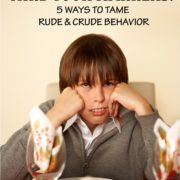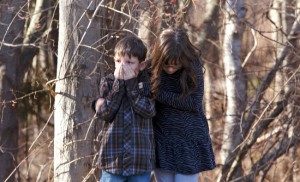Parents; How to Talk to Your Children about The Oklahoma Tornado
“Hi Robyn; We’re fine. It missed us by 2 street blocks. We’re fine, our houses are fine. So sorry we weren’t able to call or text during the storm. We love you guys.”

In the recent past, I’ve written articles about how to talk to children about horrifying events such as the SandyHook, Connecticut shooting and The Boston Marathon bombing. In both articles, while incredibly concerned, I was not touched personally by the tragedies. I had lived in Boston for many years (I received my PhD from Tufts University near Boston) and made many friends there—but nobody I knew had attended the marathon and all were perfectly safe during the tragedy.
Yesterday, a massive tornado hit Moore, OK. I couldn’t believe it when I saw the name in the news. Moore? I have a deep personal tie to Moore. Both my children were born there. Both of their adoptions took place in Moore. And most significantly, the birth family of both my children still live in Moore. Their birth mother, their birth father and their birth grandmother.
Many of you who are constant, devoted readers of my parenting site know that we have an open adoption plan with my children’s birth family. This is not just on paper. We are extremely close with the birth family—so much so that none of us regard each other as “birth family” and “adoptive family” (I only use those names here to avoid confusion)—we just call each other family.
I am so happy to report that our family members in Moore are all safe. The message on the top of this article was left by our children’s birth grandmother. We have been in contact over the last 2 days and while our whole family had quite a scare, they got out of the storm unscathed. The tornado passed 2 miles away from my kids’ birth father’s house and a ¼ mile from his girlfriend’s place of work. He was holed up in a bank vault for safety while my kids’ birth mother took refuge in a Walmart with a hundred other people. The kids’ birth grandmother literally drove herself away from the oncoming storm. The whole thing is beyond scary.
The experience has given me a more nuanced perspective of how to talk to children about frightening events such as this tornado in Oklahoma. Since my children (especially my 4 year old) know about the storm and how it affected our family, it is from this perspective that I write my tips today.
(1) Ensure your children know that this tornado is not a threat to their safety: “Is the tornado coming here” my daughter wondered? Sometimes just saying; “no, it’s all done” is enough. Other times, for the very curious child, this may be a good for a little weather lesson. You can say; “Just like a speed bump in the road slows down cars, most people believe that something gets in the way of tornadoes making them slow down until they are no longer tornadoes anymore. That’s what happened to this tornado! So no, it’s all done. The tornado is not coming here.”
(2) Listen to their fears: Parents often want to “fix the fear” or diminish the importance of it as soon as possible. Take a moment to listen instead. It is valid that your children may be scared. Ask questions like “What is scaring you?” and “What might make you feel better?” Reflect their concerns by saying: “Yes; it’s scary to hear that the tornado hurt some people” or “I get the feeling that you are worried about tornadoes coming to our town.” Steer clear of saying; “Don’t be scared” or “Stop worrying so much” as it invalidates their emotions—which are quite real.
(3) Turn off the news: Make sure the information your children are learning is from you rather than from the TV. The news can be very graphic and not at all age-appropriate. While you may want to keep posted on what’s going on, do it privately rather than in front of your children.
(4) Let them know about the positive stories: This morning I heard about a teacher who kept her students safe in the school while the tornado came through town. Tell your children about that. There have been reports that, through his family foundation, Oklahoma City Thunder star Kevin Durant pledged $1 million to the American Red Cross disaster relief efforts in Oklahoma. Tell your children about that. This morning it was reported that the OK Highway Patrol confirms that 101 people were found alive in Moore overnight. Tell your children about that. In this tragedy, there was good news—and children need to know about these stories. There are a lot of helpers and we are so grateful.
(5) Encourage them to do something to help: My daughter is only four and my son is just shy of three—but that doesn’t mean they can’t do anything to help. They can write letters, draw pictures and may even be able to help donate items needed. But perhaps their voices of love may be the kindest thing to provide. We had our daughter call her birth mother, her birth father and her birth grandmother and leave a message on their phones (getting through is still tricky). She was able to say; “Hi, I love you and I’m so glad you’re safe.” The act of “doing” can be very reassuring for a young person. Actually, it can be very reassuring for all of us!
During all of this—stay calm. Our children absorb the emotion we release. That doesn’t mean we need to be stoic or happy—it just means that we should leave the heavy burden of our feelings to our peers and our adult loved ones. You can say; “I’m sad for all the people in Oklahoma who are having a tough time right now because of the tornado. I wish it didn’t happen.”
Because really; don’t we all feel that way?




 Dr. Robyn Silverman answers one parent’s question about how to instill manners in her children– especially when they haven’t been overtly enforced in the past.
Dr. Robyn Silverman answers one parent’s question about how to instill manners in her children– especially when they haven’t been overtly enforced in the past.
 In the above video, I talk in depth about 6 tips to helping children keep a positive attitude including:
In the above video, I talk in depth about 6 tips to helping children keep a positive attitude including: As you can probably imagine, I felt like the shoemaker’s daughter. I didn’t just work with children and families, I provided parenting tips and tactics to moms and dads around the world…all the while housing a secret that taunted and tortured me every day. I couldn’t get pregnant. Well, that’s not exactly true. I was pretty good at getting pregnant. I just couldn’t seem to stay that way.
As you can probably imagine, I felt like the shoemaker’s daughter. I didn’t just work with children and families, I provided parenting tips and tactics to moms and dads around the world…all the while housing a secret that taunted and tortured me every day. I couldn’t get pregnant. Well, that’s not exactly true. I was pretty good at getting pregnant. I just couldn’t seem to stay that way. We have all heard the horrific news by now.
We have all heard the horrific news by now.